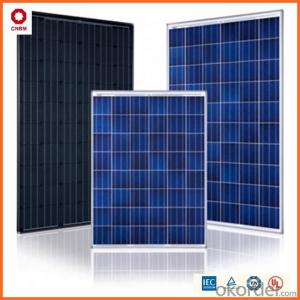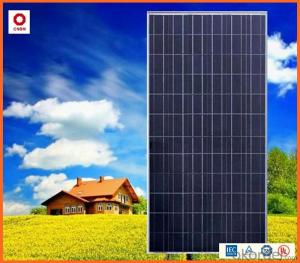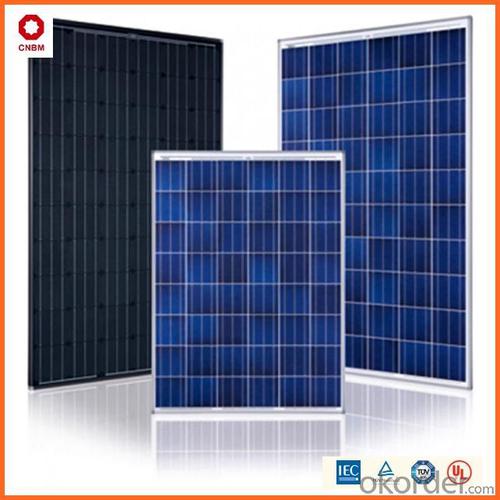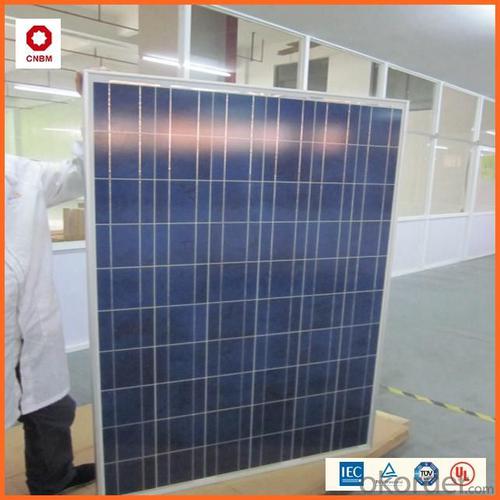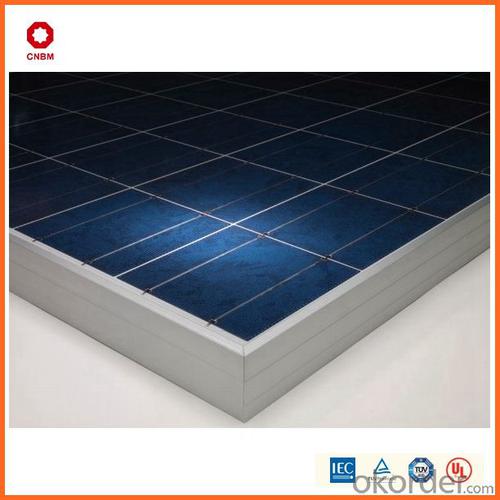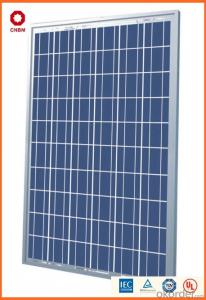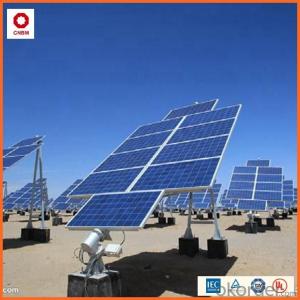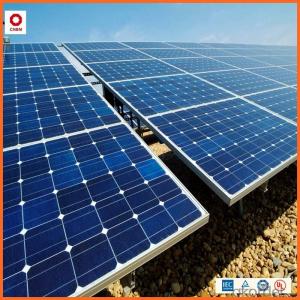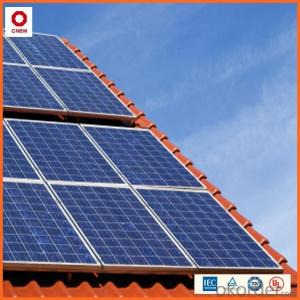Solar Energy Systems Spain ☆☆☆stock on sale 255w poly solar panel 0.45/w!!!!☆☆☆ a grade good quality
- Loading Port:
- China main port
- Payment Terms:
- TT OR LC
- Min Order Qty:
- 1 watt
- Supply Capability:
- 10000000 watt/month
OKorder Service Pledge
OKorder Financial Service
You Might Also Like
Product Description:
Hot Sale !!! Quality and Safety of 245w-320w Poly Solar Panel
1. Rigorous quality control meets the highest international standards.
2. High-transmissivity low-iron tempered glass, strong aluminium frame.
3. Using UV-resistant silicon.
4. IS09001/14001/CE/TUV/UL
Warranties of 245w-320w Poly Solar Panel
1. 10 years limited product warranty
2. 15 years at 90% of the minimal rated power output
3. 25 years at 80% of the minimal rated power output
Technical date of 245w-320w Poly Solar Panel
ITEM NO.: | Mono 125*125 cell ,36pcs . Power range from 80Wp-100Wp | ||||||||
Maximum Power(W) | 80 | 85 | 90 | 95 | 100 | ||||
Optimum Power Voltage(Vmp) | 17.81 | 17.89 | 17.94 | 17.99 | 18.06 | ||||
Optimum Operatige Current(Imp) | 4.78 | 4.91 | 5.12 | 5.35 | 5.59 | ||||
Open Circuit Voltage(Voc) | 21.98 | 22.05 | 22.14 | 22.28 | 22.45 | ||||
Short Circuit Current(Isc) | 4.95 | 5.15 | 5.36 | 5.65 | 5.84 | ||||
Solar Cell: | 125*125 Mono | ||||||||
Number of Cell(pcs) | 4*9 | ||||||||
Brand Name of Solar Cells | JA Cell, Bluesun Cell | ||||||||
Size of Module(mm) | 1580*808*35 | ||||||||
Caple & Connector Type | Pass the TUV Certificate | ||||||||
Frame(Material Corners,etc.) | Aluminium-alloy | ||||||||
Backing (Brand Type) | TPT | ||||||||
Cell Efficiency for 100W(%) | 15.8% | ||||||||
Weight Per Piece(KG) | 12.0KG | ||||||||
FF (%) | 70-76% | ||||||||
Junction Box Type | Pass the TUV Certificate | ||||||||
Tolerance Wattage(e.g.+/-5%) | ±3%, or 0-3% | ||||||||
Front Glass Thikness(mm) | 3.2 | ||||||||
Temperature Coefficients of Isc(%) | +0.04 | ||||||||
Temperature Coefficients of Voc(%) | -0.38 | ||||||||
Temperature Coefficients of Pm(%) | -0.47 | ||||||||
Temperature Coefficients of Im(%) | +0.04 | ||||||||
Temperature Coefficients of Vm(%) | -0.38 | ||||||||
Temperature Range | -40°C to +85°C | ||||||||
Surface Maximum Load Capacity | 2400Pa | ||||||||
Allowable Hail Load | 23m/s ,7.53g | ||||||||
Bypass Diode Rating(A) | 12 | ||||||||
Warranty | 90% of 10 years,80% of 25 years. | ||||||||
Standard Test Conditions | AM1.5 1000W/ 25 +/-2°C | ||||||||
Packing | carton or pallet | ||||||||
1*20' | 25 Pallets / 450pcs | ||||||||
1*40'STD | 25 Pallets / 100pcs | ||||||||
Features of our products:
• High conversion efficiency mono/poly-crystalline amorphous silicon solar cells
• Modules incorporate high performance bypass diodes to minimize the power drop caused by shading
• High transmittance, low-iron tempered glass
• High performance EVA encapsulant to prevent destroying and water.
• AI frame: without screw, corner connection. 8 holes on the frame can be installed easily
• Good performance of preventing from atrocious weather such as wind and hails
• Certifications: CE IEC TUV VDE UL, Class I
• 10 years 90% power output warranty

Shipping of 245w-320w Poly Solar Panel
By Sea | Delivery from Shanghai or Ningbo seaport |
By Air | Departure from Shanghai Pudong Airport |
By Express | Post by DHL, EMS, UPS, TNT. |
- Q: Can a solar energy system be used in areas prone to earthquakes?
- Yes, a solar energy system can be used in areas prone to earthquakes. Solar panels are typically designed to withstand various weather conditions, including earthquakes. They are built to meet specific structural standards and are tested for durability. Additionally, solar energy systems do not rely on any intricate moving parts, making them less vulnerable to damage during seismic activities. However, it is important to ensure proper installation and adhere to local building codes to enhance their resilience in earthquake-prone areas.
- Q: Can solar energy systems be used in areas with high electrical demand?
- Yes, solar energy systems can be used in areas with high electrical demand. With advancements in technology, solar energy systems have become more efficient and can now generate a significant amount of electricity. Additionally, solar energy systems can be combined with energy storage solutions to ensure a continuous power supply, even during periods of high demand. This makes solar energy a viable option for meeting the electrical needs of areas with high energy requirements.
- Q: Can solar energy systems be used for powering agricultural machinery?
- Yes, solar energy systems can be used for powering agricultural machinery. Solar panels can generate electricity which can be used to power various farm equipment such as irrigation pumps, grain dryers, and tractors. This helps reduce dependence on fossil fuels, lowers operating costs, and promotes sustainable agricultural practices.
- Q: Solar power generation system how to choose?
- The power of the solar panel is determined by the efficiency of the battery, the material assembled into the solar panel and the process. The process and material of the big brand is generally no problem, but the battery is also high and low, the price difference is also very large, to ask about the efficiency of battery and components. 250W single crystal battery pack 18.6% is sufficient, the standard specification 1650mm*992mm, the components are generally in the; 250W polycrystalline battery sheet in the 17.6% sufficient, standard specifications, components generally in the 15.3%.
- Q: Can solar energy systems be used in areas with limited access to the electrical grid?
- Yes, solar energy systems can be used in areas with limited access to the electrical grid. Solar energy is a decentralized and off-grid solution that can be deployed in remote or off-grid locations. It provides a reliable and sustainable source of electricity, especially in areas where grid infrastructure is lacking or unreliable. Solar systems can be easily installed and can power homes, businesses, and even entire communities, allowing them to have access to electricity without relying on the traditional electrical grid.
- Q: Can a solar energy system be installed on a sports field or stadium?
- Yes, a solar energy system can be installed on a sports field or stadium. This can help generate clean and renewable energy to power the facility, reduce electricity costs, and promote sustainability. Additionally, the large surface area of sports fields and stadiums provides ample space for the installation of solar panels or solar canopies.
- Q: Can solar energy systems be used in areas prone to hurricanes or tornadoes?
- Yes, solar energy systems can be used in areas prone to hurricanes or tornadoes. While extreme weather events like hurricanes and tornadoes can potentially damage solar panels, advancements in technology and installation practices have made solar systems more resilient and able to withstand such conditions. For instance, solar panels are designed and tested to withstand high wind speeds and impact from debris. Additionally, proper installation techniques, such as using reinforced mounting systems and ensuring secure attachment to roofs or the ground, can further enhance their resistance. Therefore, while precautions need to be taken, solar energy systems can still be a viable and sustainable option in areas prone to hurricanes or tornadoes.
- Q: Can solar energy systems be used for powering off-grid research stations in Antarctica?
- Yes, solar energy systems can be used for powering off-grid research stations in Antarctica. Solar panels can be installed to capture sunlight and convert it into electricity, which can then be stored in batteries for use during periods of low sunlight. This renewable energy source is a viable and sustainable option for powering remote research stations in Antarctica, reducing reliance on fossil fuels and minimizing environmental impact.
- Q: Can solar energy systems be used for powering electric boat charging stations?
- Yes, solar energy systems can be used for powering electric boat charging stations. Solar panels can be installed on the charging station's roof or nearby to harness sunlight and convert it into electricity. This renewable energy source can then be used to charge electric boats, making the charging process eco-friendly and sustainable.
- Q: Can a solar energy system be used during a power outage?
- During a power outage, a solar energy system can indeed be utilized. The ability of solar power to supply electricity even in the absence of a functioning grid is one of its key advantages. This feat is accomplished through the utilization of battery storage systems or backup generators. When the sun is out, solar panels not only produce electricity but also charge the batteries simultaneously. Consequently, these batteries can then furnish power to vital appliances and devices during a power outage. Nevertheless, it is crucial to bear in mind that the duration and quantity of power accessible during such an outage will be contingent on the solar system's capacity and the size of the battery storage. Moreover, a proper system design and installation are imperative to ensure the safe and efficient operation of the solar energy system during an outage.
Send your message to us
Solar Energy Systems Spain ☆☆☆stock on sale 255w poly solar panel 0.45/w!!!!☆☆☆ a grade good quality
- Loading Port:
- China main port
- Payment Terms:
- TT OR LC
- Min Order Qty:
- 1 watt
- Supply Capability:
- 10000000 watt/month
OKorder Service Pledge
OKorder Financial Service
Similar products
Hot products
Hot Searches
Related keywords
